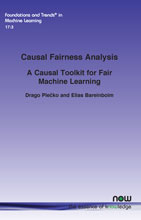Causal Fairness Analysis: A Causal Toolkit for Fair Machine Learning
By Drago Plečko, Seminar für Statistik, ETH Zürich, Switzerland, drago.plecko@stat.math.ethz.ch | Elias Bareinboim, Department of Computer Science, Columbia University, USA, eb@cs.columbia.edu
Abstract
Decision-making systems based on AI and machine learning have been used throughout a wide range of real-world scenarios, including healthcare, law enforcement, education, and finance. It is no longer far-fetched to envision a future where autonomous systems will drive entire business decisions and, more broadly, support large-scale decision-making infrastructure to solve society’s most challenging problems. Issues of unfairness and discrimination are pervasive when decisions are being made by humans, and remain (or are potentially amplified) when decisions are made using machines with little transparency, accountability, and fairness. In this monograph, we introduce a framework for causal fairness analysis with the intent of filling in this gap, i.e., understanding, modeling, and possibly solving issues of fairness in decision-making settings.
The main insight of our approach will be to link the quantification of the disparities present in the observed data with the underlying, often unobserved, collection of causal mechanisms that generate the disparity in the first place, a challenge we call the Fundamental Problem of Causal Fairness Analysis (FPCFA). In order to solve the FPCFA, we study the problem of decomposing variations and empirical measures of fairness that attribute such variations to structural mechanisms and different units of the population. Our effort culminates in the Fairness Map, the first systematic attempt to organize and explain the relationship between various criteria found in the literature. Finally, we study which causal assumptions are minimally needed for performing causal fairness analysis and propose the Fairness Cookbook, which allows one to assess the existence of disparate impact and disparate treatment.
Causal Fairness Analysis: A Causal Toolkit for Fair Machine Learning
The recent surge of interest in AI systems has raised concerns in moral quarters about their ethical use and whether they can demonstrate fair decision taking processes. Issues of unfairness and discrimination are pervasive when decisions are being made by humans, and are potentially amplified when decisions are made using machines with little transparency, accountability, and fairness. In this monograph, the authors introduce a framework for causal fairness analysis to understand, model, and possibly solve issues of fairness in AI decision-making settings.
The authors link the quantification of the disparities present in the observed data with the underlying, often unobserved, collection of causal mechanisms that generate the disparity in the first place, a challenge they call the Fundamental Problem of Causal Fairness Analysis (FPCFA). In order to solve the FPCFA, they study the mapping variations and empirical measures of fairness to structural mechanisms and different units of the population, culminating in the Fairness Map.
This monograph presents the first systematic attempt to organize and explain the relationship between various criteria in fairness and studies which causal assumptions are needed for performing causal fairness analysis. The resulting Fairness Cookbook allows anyone to assess the existence of disparate impact and disparate treatment. It is a timely and important introduction to developing future AI systems incorporating inherent fairness and as such will be of wide interest not only to AI system designers, but all who are interested in the wider impact AI will have on society.
